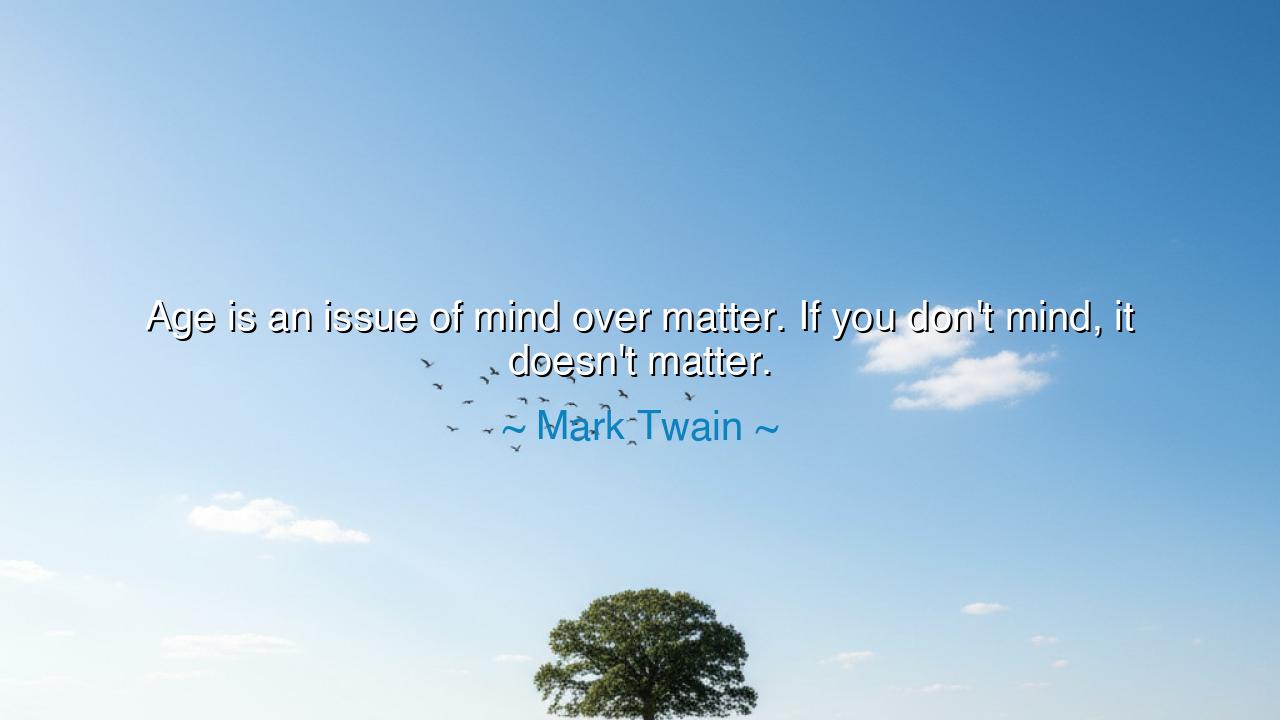
Age is an issue of mind over matter. If you don't mind, it






In the boundless course of human existence, there is a profound truth embedded in Mark Twain’s words, “Age is an issue of mind over matter. If you don't mind, it doesn't matter.” This simple yet powerful statement speaks to the timeless reality that age is not merely a number dictated by the passage of time, but a mindset, a perspective we choose to adopt. Twain’s insight suggests that the way we perceive aging shapes its impact on our lives. If we resist the limitations that society places upon us as we grow older, we free ourselves from the shackles of time and experience the vitality of youth, no matter the number of years we have lived.
The ancients, too, understood that age was a matter of mind and spirit, not just the body. Socrates, the great Greek philosopher, lived to an advanced age, yet he remained unbowed by the passage of time. He sought wisdom throughout his life, and his mind was always engaged, always in pursuit of greater understanding, regardless of the toll that age had on his physical form. Plato records in his dialogues that Socrates, despite his old age, was more energetic and vibrant than many of the younger men in Athens. This aligns with Twain’s philosophy — it is not the number of years that matters, but the mindset we adopt towards those years. Socrates’ life reminds us that a mind in motion, a mind focused on growth, is forever young.
Consider the story of Leonardo da Vinci, who, even in his later years, continued to create groundbreaking works of art, science, and engineering. Despite the physical toll of age, Leonardo’s mind was as sharp as ever, constantly seeking new challenges and ideas. Twain’s quote could well describe the spirit of da Vinci, who viewed age not as a burden but as an opportunity to continue expanding his knowledge and pushing the boundaries of human possibility. Like Twain’s assertion that age is mind over matter, da Vinci’s persistence in the face of time’s inevitable toll speaks to the power of an engaged mind in overcoming physical limitations.
In a more modern context, the life of Nelson Mandela offers a remarkable example of how mindset can triumph over the effects of age. Mandela was imprisoned for 27 years, yet his spirit remained indomitable throughout his life, especially as he entered his later years. Upon his release, even though his body had been weakened by years of confinement, his mind remained sharp, and his commitment to justice and reconciliation remained unwavering. Mandela's example teaches us that the real power of age lies not in what the body can or cannot do, but in the will to continue to act with purpose and clarity of mind, no matter the number of years one has lived.
The truth in Twain’s words also resonates deeply in the field of art and creativity, where age often becomes a measure not of decline, but of deepened wisdom. Michelangelo, the master sculptor and painter, created some of his most revered works in the later years of his life. Though his hands became frailer, his mind was still filled with the fire of creation. Just as Twain suggests, Michelangelo’s refusal to be bound by the physical limitations of age is a testament to the fact that true youth is found in the spirit, in the energy we bring to our work, to our passions, and to the world around us.
The lesson here is both simple and profound: age need not be seen as a force that weakens us, but as an opportunity to transform, to embrace the richness of experience while staying youthful in spirit. Twain’s wisdom reminds us that it is our mindset — our attitude toward life — that determines how we experience aging. If we approach the later stages of life with curiosity, enthusiasm, and purpose, we can continue to thrive. Like Socrates, da Vinci, and Mandela, we must cultivate an inner vitality, refusing to let age be an excuse for stagnation, and instead using it as fuel for growth and discovery.
In practical terms, this means that we must nurture our minds as we age, feeding them with knowledge, new experiences, and the drive to keep learning. Whether it is through reading, engaging in creative pursuits, or simply embracing the unknown, we must never stop evolving. And just as Twain advises, we must not mind the number of years we accumulate, but rather focus on the joy of each passing moment and the opportunities that come with it. For in doing so, we create lives that are not defined by age, but by the spirit of youth that endures regardless of the years.
Let us then, in the spirit of the ancients, honor the wisdom of Twain, and embrace each year not as a limitation, but as a new chapter in the endless journey of growth and discovery. Let us approach age not as a burden to bear, but as a privilege to be cherished, knowing that the true measure of life lies not in how long we live, but in how vibrantly we live. As long as our mind remains alive and curious, we are never truly old, and the years are but markers along the way of a life well-lived.






AAdministratorAdministrator
Welcome, honored guests. Please leave a comment, we will respond soon